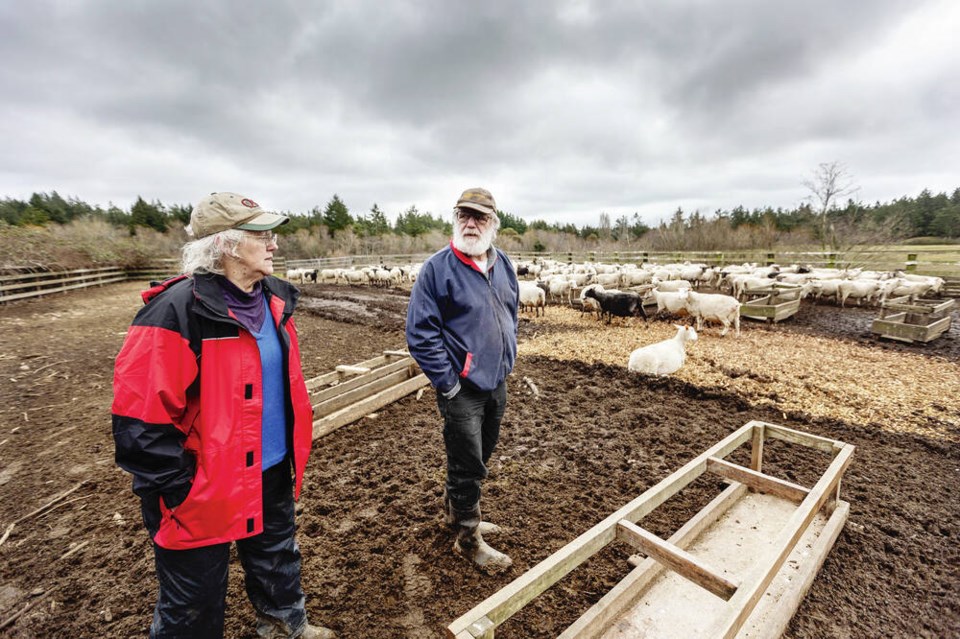John and Lorraine Buchanan have lost 40 lambs and three ewes to cougar kills so far this year, and the farmers fear the death count could mount as black bear season is just beginning.
It’s a shocking number of losses for the Parry Bay Sheep Farm in Metchosin — the worst for predators in 50 years at the farm — and they are already struggling with drought-hit pastures and the extra costs of buying grain to feed their herds.
“It’s never been this bad,” said John Buchanan. “We hadn’t lost one to a predator before 1995, other than a loose dog. There were no predators here then.”
“We don’t like to see cougars killed and we don’t like our sheep being taken, either, so it’s sad,” said Lorraine Buchanan.
“It has been a terrible year so far for predation and the bears haven’t even started. That’s a lot.”
The Buchanans have come to expect some losses of lambs and ewes to cougars, and heading into summer more black bear attacks on sheep, but this year has been especially lethal for their herds.
“The cougars are not afraid of people anymore,” said Buchanan, noting that a neighbouring hobby farm had a sheep killed by a cougar in daylight in front of children. “Out here we’re kind of a buffer zone and an early warning system. This wouldn’t be acceptable in View Royal or Victoria.”
The Conservation Officer Service confirmed it has captured and euthanized six cougars in Metchosin and surrounding area this year.
“The service has dedicated significant resources in response to cougar complaints in the Metchosin area over the last several months,” the agency said in a statement.
“Conservation officers strongly encourage farmers to implement best practices to protect both livestock and wildlife,” it said. “Livestock management techniques are always encouraged to help prevent conflicts from happening in the first place.”
Cougars have been active in the Thetis Lake, Metchosin and Colwood areas for the past year, with several house cats taken, and a female jogger followed in the Royal Bay-Latoria Road area. Experts say the big cats have large ranging areas and are being pressured by urban development.
Parry Bay Sheep Farm is the Island’s largest sheep farm and has 260 ewes that gave birth to 600 lambs this year.
Since January, cougars have been killing lambs at an alarming rate on the farm’s leased pastures ranging from the Highlands to East Sooke. Others have been wounded. Most of the attacks were in the Metchosin area.
Lorraine Buchanan believes the cougars are females with yearling cubs.
“They’ve been able to do this for a few years and are teaching their young,” she said. “It makes it hard to farm.”
The kills have forced the Buchanans to shift small herds of sheep off dangerous pastures to safer ground, which puts pressures on the grasses available and means the Buchanans have to supplement their feeding with hay and feed at extra costs.
A cold and dry spring meant the pasture grasses are well below normal.
“Losing the pasture resource is a huge hit for us, and it’s also the second worst hay crops we’ve ever had with the drought,” said John Buchanan.
“It’s stepping up to be a very poor year and at what point do you reach too many losses and just can’t farm any more?”
Conservation officers said electric fencing is considered a deterrent to help protect farm animals from predators, but Buchanan said cougars can easily hop over the fencing. It’s also expensive and involves extra work and costs because six feet on either side of electric fencing has to be trimmed back to keep the system from shorting out.
She said it’s also not practical to invest thousands of dollars into properties they are only leasing for short periods.
Large dog breeds as well as donkeys and llamas have been used as guard animals, but positioning the protectors on so many fields is difficult. Dogs, in particular, are difficult to use because many of the pastures are close to walking paths or busy roadways and “may not be safe for the dogs or people,” said Lorraine Buchanan.
The Buchanans have three donkeys, but lost one to a black bear a few years ago after lendding it to a neighbour. “Donkeys aren’t fool proof either,” she said.
The Conservation Officer Service said while it recognizes losing sheep is frustrating it is not the mandate of the service to create predator-free zones, adding proper livestock management is critical to help reduce predation and lessen livestock losses.
“Conservation officers must prioritize public safety calls for service as the highest priority, such as those related to dangerous hunting or dangerous wildlife in urban and rural settings that pose a significant risk to human safety,” the service said. “It is not the role — nor is it operationally feasible — for conservation officers to be on standby to immediately respond to a cougar-livestock issue.”
Bears and cougars haven’t been the only worry for sheep farmers.
Ravens are also a threat to newborn lambs. This year, one died when a raven flew into a barn and attacked a lamb just days old, picking a hole in its head. The lamb succumbed to infection and died despite efforts to save it, said Buchanan.
>>> To comment on this article, write a letter to the editor: [email protected]



